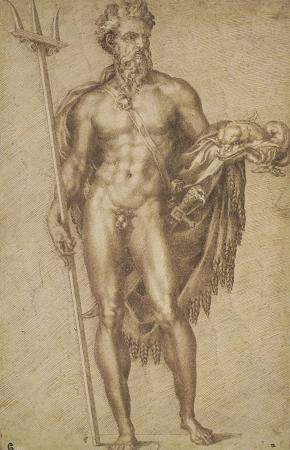Andrea Doria (1466 - 1560). Andrea Doria, Prince of Melfi was a Genoese statesman, condottiero, and admiral, who played a key role in the Republic of Genoa during his lifetime. As the ruler of Genoa, Doria reformed the Republic's constitution. Originally elected for life, the Doge's office was reduced to two years. At the same time plebeians were declared ineligible, and the appointment of the doge was entrusted to the members of the great and the little councils. His reformed constitution of the Republic of Genoa would last until the end of the republic in 1797. From 1528 until his death, Doria exercised a predominant influence in the councils of the Genoese republic. He is also considered the foremost naval leader of his time. Several ships were named in honour of the admiral, the most famous being the Italian passenger liner SS Andrea Doria, launched in 1951, which sank following a collision in 1956. Doria was born at Oneglia from the ancient Genoese family the Doria di Oneglia, a branch of the noble Doria family, who played a major role in the history of the Republic since the 12th century. His parents were related: Ceva Doria, co-lord of Oneglia, and Caracosa Doria, of the Doria di Dolceacqua branch. Orphaned at an early age, he became a soldier of fortune, serving first in the papal guard and then under various Italian princes. In 1503, he fought in Corsica in the service of the Genoese Navy, at that time under French vassalage, and took part in the rising of Genoa against the French, whom he compelled to evacuate the city. From that time onwards, he became famous as a naval commander. For several years he scoured the Mediterranean in command of the Genoese fleet, waging war on the Turks and the Barbary pirates and defeating them at Pianosa. In the meanwhile Genoa had been recaptured by the French, and in 1522 by the armies of the Spanish Empire.But Doria joined the French or popular faction and entered the service of King Francis I of France, who made him captain-general; in 1524 he relieved Marseille, which was besieged by the Imperials, and later helped to place his native city once more under French domination. His ships, under the command of his nephew, Filippino Doria, crushed a Spanish squadron on 28 April, 1528 at the Battle of Capo d'Orso. Dissatisfied with his treatment at the hands of Francis, who was mean about payment, he resented the king's behavior in connection with Savona, which he delayed handing back to the Genoese as he had promised. Consequently, on the expiration of Doria's contract he entered the service of Emperor Charles V. As imperial admiral, he commanded several expeditions against the Ottoman Empire between 1530 and 1541. He captured Koroni and Patras, and co-operated with the emperor himself in the capture of Tunis. Charles found him an invaluable ally in the wars with Francis I, and through him extended his domination over the whole of Italy. In February 1538, Pope Paul III succeeded in assembling a Holy League against the Ottomans, but Hayreddin Barbarossa defeated its combined fleet, commanded by Andrea Doria, at the Battle of Preveza in September 1538. This victory secured Turkish dominance over the eastern Mediterranean for the next 33 years, until the Battle of Lepanto in 1571. Doria accompanied Charles V on the ill-fated Algiers expedition of 1541, of which he disapproved, and which ended in disaster. For the next five years he continued to serve the emperor in various wars, in which he was generally successful and always active, although now over seventy years old. In September 1528 Andrea Doria and his forces drove the French out of Genoa and were triumphantly received by the city. Doria reformed the constitution in an aristocratic sense, eliminating the factions that had plagued the republic in the past centuries, and constituted a new oligarchic form of government composed of the city's principal aristocratic families, creating 28 Alberghi or clans. The 28 Alberghi that formed this new ruling class included the Cybo, Doria, Fieschi, Giustiniani, Grimaldi, Imperiale, Pallavicino, and Spinola families. He refused offers to take the lordship of Genoa and even the dogeship, but accepted the position of perpetual censor, and exercised predominant influence in the councils of the republic until his death. The title censor in this context was modeled on its meaning in the Roman Republic, i.e., a highly respected senior public official, rather than its modern meaning having to do with censorship. He was given two palaces, many privileges, and the title of Liberator et Pater Patriae.
more...



